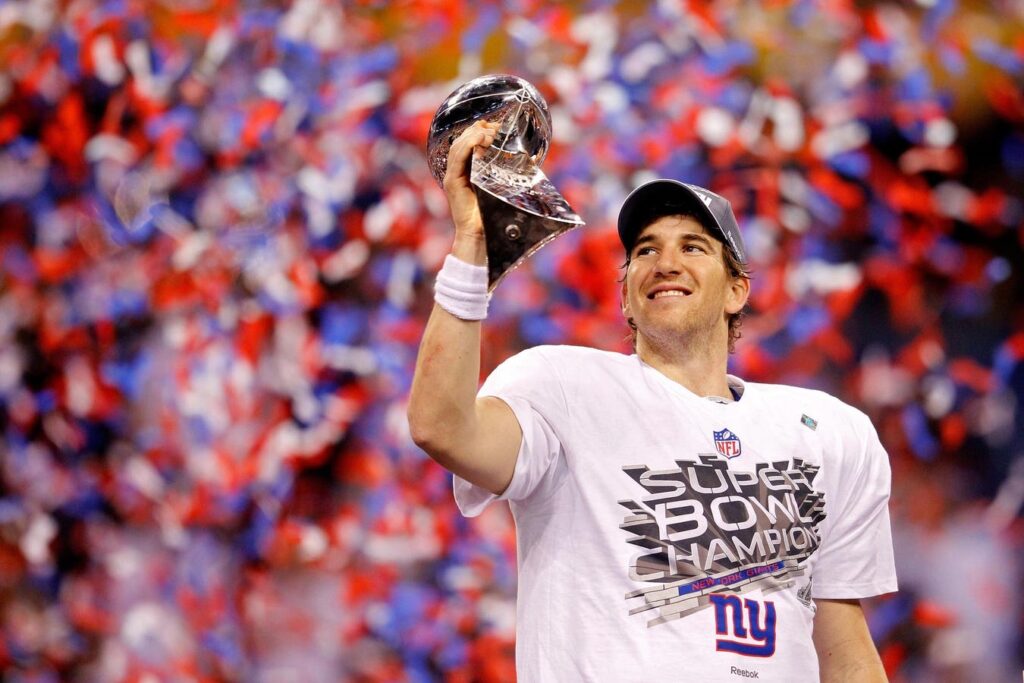INDIANAPOLIS, IN – FEBRUARY 05: Quarterback Eli Manning #10 of the New York Giants poses with the … [+]
From the mid-2000s to the end of the 2010s, the hierarchy of franchise quarterbacks was consistent from year to year.
Tom Brady and Peyton Manning always feuded atop the charts, while Aaron Rodgers, Drew Brees, and Ben Roethlisberger seemed to always be in that next tier below. Then the conversation would open up to the Matt Ryans and Phillip Rivers of the league.
As we can now look back and fully analyze the careers of these franchise centerpieces, those tier lists seem to be the lines of division between whether or not they are Hall Of Fame quarterbacks.
There is no debate on Brady and Peyton being qualified to get in. In the same breath, there is likely no argument strong enough for Ryan and Rivers to have their busts made.
However, the middle tier is where debates can be made either way. Brees’s bulky resume likely guarantees his induction into the Hall of Fame.
Brees has successful longevity, individual seasons of exceptional passing metrics, and a Super Bowl. Rodgers and Roethlisberger make it interesting because their arguments for the Hall of Fame somewhat clash.
While Rodgers has had a better career numerically and subjectively than Roethlisberger, he only has one Super Bowl to Big Ben’s two. So, what will the voters prioritize?
This is a debate for another day, but it is an important distinction ahead of the 2025 NFL Hall of Fame voting.
Throughout his career, Eli Manning always seemed to be lumped into the third tier of this quarterback hierarchy.
But when Manning continues to remain on the list until decision day arrives for the NFL writers, do not be surprised if the former Giant receives a golden jacket, and rightfully deserves to be in the second-tier.
EAST RUTHERFORD, NJ – DECEMBER 13: Eli Manning #10 of the New York Giants reacts during the game … [+]
On Saturday, when the NFL released the official Hall of Fame finalists, Manning was yet again the center of debate in this grouping.
With this debate comes the discussion around his career statistics, which admittedly may pale in comparison when put up against the rest of the Hall of Fame quarterbacks.
The only statistics Manning led the NFL in throughout a particular season are as follows: interceptions (3 times), longest completion (twice), sack percentage, 4th quarter comebacks, and game-winning drives.
For his 16-year career, Manning finished with a perfect 117-117 record, 57,023 passing yards on a 60.3% completion percentage, 366 touchdowns, and 244 interceptions. In each of these metrics, Manning is in the top 14 in NFL history.
With 234 career starts for the Big Blue, he was able to finish at the top of practically every franchise record in New York. But with a career reflection that does not stand out, it is easy to dismiss Manning’s legacy as one of volume statistics.
However, Eli is a perfect example of the cliche often used when deeming if a player is deserving of NFL immortality: you cannot tell the story of football without number 10.
The only season-to-season accolades Manning owns are four Pro Bowl selections. He was never in the running for MVP, Offensive Player of the Year, or any other distinctions to show he was above the rest for a given regular season.
In the playoffs is where Manning cemented his legacy, in more ways than most may realize.
Statistically, Manning improved his per-game metrics in terms of passer rating (87.4), completion percentage (60.5%), touchdown to interception ratio (18 TDs to 9 INTs), and adjusted yards per passing attempt (6.93).
Manning is 8-4 in the playoffs in his career, with a 5-2 record in road playoff games. Manning was able to finish within the top-25 quarterbacks in NFL history with those eight playoff victories, despite only reaching the postseason in six of his 16 seasons.
And of course, what Manning will always go down in NFL history for is his role as the Patriots slayer, winning both of his Super Bowls against the New England dynasty.
In both of these Super Bowls, Manning was a combined 49 for 74 with 551 yards, 3 touchdowns to 1 interception, and a passer rating of 95.5.
EAST RUTHERFORD, NJ – NOVEMBER 22: Eli Manning #10 of the New York Giants completes a pass under … [+]
These performances were strong enough to earn him two Super Bowl MVPs, making him one of six players to win multiple, joining Bart Starr, Terry Bradshaw, Joe Montana, Tom Brady, and then eventually Patrick Mahomes.
Even though those performances on the greatest stage will always be what fans remember most about the Giants captain, those two separate runs to get to the Super Bowl were just as memorable.
In 2008, Manning had to lead New York on the road in all three games, defeating the Buccaneers, Cowboys, and Packers to have a chance at the undefeated Patriots. 2011 was not much easier, defeating the Falcons, Packers, and 49ers for a date with Brady yet again.
In those two playoff runs, Manning threw for 15 touchdowns with just 2 interceptions.
Simply put, Eli Manning is never going to find himself in the conversation for the best quarterback in NFL history. As a most suspect, several names come up before Manning enters the conversation at all.
However, it may have fewer names than most people suspect. And the only names definitively ahead of Manning in terms of value added to an organization are those either already in Canton or on a trajectory to wind up there.
So, be prepared for Manning’s historic postseason performances to be etched on his plaque in Ohio, as Manning may not just get into the NFL Hall of Fame, but it may come in his first year on the ballot.
Read the full article here
